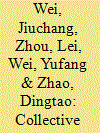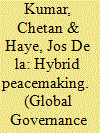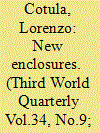| Srl | Item |
| 1 |
ID:
131644


|
|
|
|
|
| Publication |
2014.
|
| Summary/Abstract |
Mass incidents are inevitable in contemporary China and the first thing we should learn is to adopt a correct attitude towards them. Based on the three elements-activity, interaction and sentiment-of collective behaviors in 52 mass incidents in China during 2007-2011, we find that collective behaviors in mass incidents show significant differences in activity, interaction and sentiment. A grade evaluation method is proposed to estimate the evolution of collective behaviors in 52 mass incidents and to classify such behaviors into five grades. Then the influence factors on the three elements are analyzed using multiple linear regression. The regression results demonstrate that the impacts of location, casualties, inner-group relations, group scale and duration on the three elements are very significant. Finally, in the light of the regression results, some implications of collective behavior in mass incidents are proposed for the relevant authorities in responding to mass incidents.
|
|
|
|
|
|
|
|
|
|
|
|
|
|
|
|
| 2 |
ID:
110233


|
|
|
| 3 |
ID:
124927


|
|
|
|
|
| Publication |
2013.
|
| Summary/Abstract |
Seven decades after its first publication, Karl Polanyi's The Great Transformation remains one of the most insightful readings about the socioeconomic changes associated with the Industrial Revolution, and the ways in which law facilitated, or countered, moves towards the commodification of land at that time. As today's global land rush brings competing land claims into contest, new transitions are occurring between more commodified and more 'socially embedded' conceptualisations of land. Using Polanyi's framework, this article analyses the role of international law in these processes. International investment law construes land as a commercial asset, can facilitate access to land for foreign investors and imposes discipline on the exercise of regulatory powers in land matters. But shifts in the political economy that underpins international investment law and growing recourse to international human rights law are creating new opportunities for reflecting the non-commercial (cultural, social, political) relations within which land rights remain embedded in many societies. When contrasting conceptualisations of land collide, the relative strength of legal rights and enforcement mechanisms become particularly important. Ultimately, the legitimacy of international law to mediate between competing land claims will depend on the extent to which it can recognise the multiple values that society attaches to land.
|
|
|
|
|
|
|
|
|
|
|
|
|
|
|
|